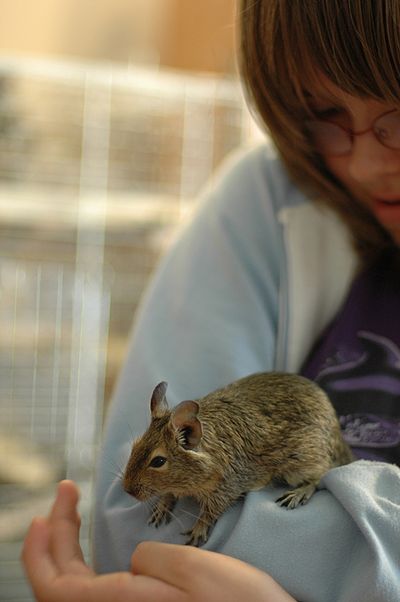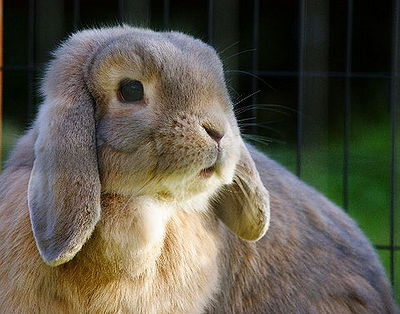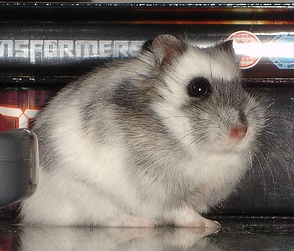
Where does the Degu come from?
Degus are a type of rodent which are closely related to the chinchilla and Guinea pig, and although they do bear some resemblance to both gerbils and squirrels they are not closely related to these species. They come from central Chile where they live in semi-arid regions at the foot of the Andes, and are active during the day. As they are sensitive to diabetes, they were first used for experimentation until it was found that they make good pets as well.
What does the Degu look like?
The Degu looks like a combination of other small rodents. The fur is brown/grey tipped with black. Pet Degus measure about 25-30 cm, about the size of an adult person´s open palm. The tail is long and hairy and carried raised. It is used for balance. Eyes are dark brown. Teeth are an unexpected orange in color. Ears are large. Degus use their front legs to pick things up, similar to what a squirrel does. Life span in captivity is about 5-8 years.
What is the personality of a Degu?
Degus’ friendly, bubbly character and gentle mannerisms make them the ideal pets for adults and older children alike. Since Degus are very social animals, you should have at least 2 as pets to avoid behavior problems. They are very curious and will enjoy playing with appropriate toys. When frightened, Degus will hide or freeze in place.
Housing
Degus are highly agile, active animals and therefore require a lot of space to keep them happy. Many degus owners house their degus in chinchilla or large rat cages, made of wire mesh with a solid, metal tray. The *minimum* recommended cage size for a pair of degus is L75 * W45 * H90 cm, but anything larger than this is ideal. Degus cannot be housed in cages with plastic bases as they can and do chew their way out of these rather quickly! Any mesh surfaces inside the cage also need to be covered (e.g. with ceramic tiles) to prevent pressure sores on the soles of their feet, a painful condition known as ´bumblefoot´. Degus can also be housed in a large aquarium but it must be fitted with a wire tank topper to provide adequate ventilation and extra levels for climbing purposes. Providing lots of levels and hammocks makes the cage a fun and safe place for your degus, as they love jumping and climbing. You should always try and keep degus in same-sex pairs or more, as they are highly social animals and easily become depressed and even physically ill if housed alone. Remember that in the wild, degus live in groups of around 6, so it is natural for them to be grouped in this way. Always be sure to check the sexes of your degus before you take them home to make sure they are both the same, as a male and female degu will readily breed. More information on housing degus can be found on Degutopia´s website under the ´degu care-housing´ menu.
Enrichment
Degus are highly intelligent and require a lot of mental stimulation to keep their minds active and occupied. They also require a lot of exercise, so a large, solid running wheel inside the cage is essential. Be sure to avoid wheels that have spokes or open rungs as these can seriously injure your degus´ tails and legs. Toys are a must-have and can come in many shapes and forms, but often the most loved toys are the cheapest (just look at how much fun your degus have with a cardboard box)! Branches from apple, hazel or hawthorn trees are also enjoyed for gnawing and sitting, but remember that many types of wood are not safe for degus so be sure to check first (a list can be found on our site). Loads of enrichment ideas can be found by visiting the ´degu care-enrichment´ section of Degutopia´s website.
Diet
Many people wrongly assume degus are hard to care for as the have very specific dietary needs; this is simply not true. The main point to note is that degus cannot cope with high levels of dietary sugar as they become diabetic very easily, therefore it is important to check that any feed you give them is sugar free. Always be sure to check the ingredients list for signs of glucose, molasses or honey, indicating it is not suitable for degus. Degutopia´s website has a full list of recommended feeds which are safe for degus. Degus actually only need a very small quantity of hard feed per day (around 10 g per degu for an adult), as the vast majority of their diet should consist of hay to mimic the type of diet they are adapted to in the wild. Good quality meadow or Timothy hay should be provided continuously to allow your degus to browse throughout the day. Water needs to be provided freely, too; degus should have fresh drinking water daily and tap water is perfectly safe as long as it is safe for you to drink from the tap. This can be provided by a drinking bottle or water dish. Fresh vegetable matter is an important part of any degu´s diet and should be provided once or twice per week in moderation. More information about diet, vegetables and treats for degus can be found on the ´degu care-diet´ section of Degutopia´s site.
Exercise
Degus also need some ´free time´ outside their cage every day to allow them to get the exercise they cannot get inside the cage. This gives them a chance to explore, provides them with important mental stimulation and also gives them a chance to play and interact with you! Degus really enjoy human company and once they have formed a bond with their owner the relationship you have with your degus can be really rewarding. Remember that degus are very easy to train and can respond to their own names, so you should have plenty to do with them every day! Any area that your degus play in needs to be ´degu proofed´ before letting them out, which should include moving all houseplants, electric cables and things you don´t want to get chewed (or stolen!) out of reach. Some owners use a large play pen for exercise where the degus can be contained during play time. It is useful to allow your degus access to a sand bath while they are out, as degus need to bathe regularly in dusting clay to keep their fur in good condition (it is also an important behavior for them).
Owning degus is great fun and really rewarding for a dedicated owner, as they give out as much (if not more) than you put in. They´re hours of entertainment and insufferably cute, plus they also have a larger than life personality. On top of this, degus live on average for 6-8 years, and some have even reached the grand old age of 15! This means that if you want more than a gerbil or hamster has to offer, want an intelligent small pet longer lived (and not as smelly!) as a rat and have the time and devotion to offer, then degus could well be just what you´re looking for.
External websites
- One of the best online resources for degus is http://www.deguworld.com.
- http://www.petstreet.co.uk/ is the UK’s leading social network for pet-lovers.
Video


